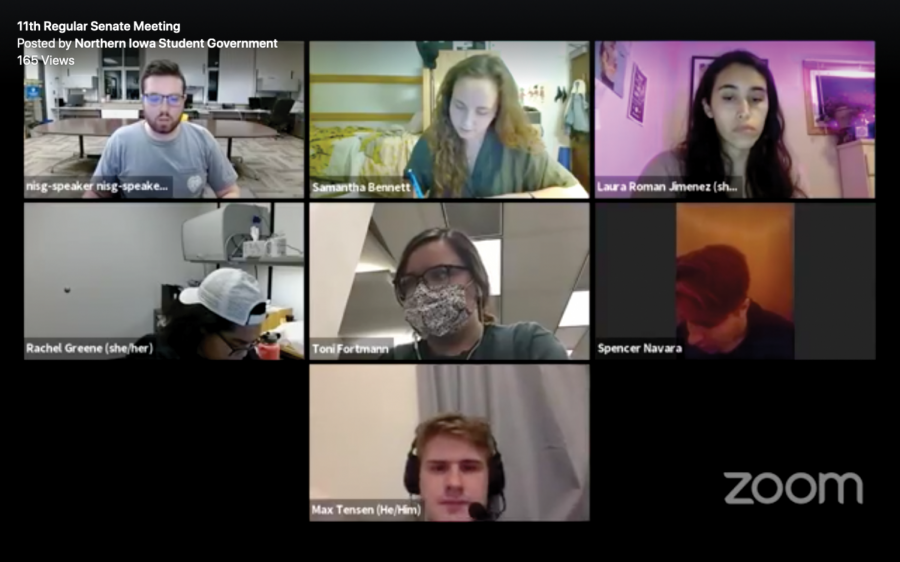Students for Life fails to pass
NISG met virtually for their eleventh regular Senate meeting on Ot. 7, during which a bill requesting approval to form a UNI chapter of the pro-life group Students for Life failed to pass, generating controversy.
Oct 12, 2020
A bill which failed to pass in the Northern Iowa Student Government (NISG) on Wednesday evening has generated controversy about free speech and the line between politics and personal opinion.
During the NISG meeting on Wednesday, Oct. 7, Chair of the Organization and Finance Committee Esha Jayswal presented SSB2021-11. The bill communicated the request of UNI Students for Life, an affiliate of the national pro-life group Students for Life, to be allowed to form a student organization at UNI.
The bill failed to pass, with those senators who voted in opposition citing concerns related to the “hateful rhetoric” of the group’s national affiliate.
However, this decision is seen by many, including other members of NISG, to have violated the NISG constitution and UNI policies, as senators may have allowed personal biases to infringe upon the group’s First Amendment rights.
NISG Supreme Court Chief Justice Bekah Bass told the Northern Iowan in an email that “an appeals process has already been initiated concerning SSB 2021-11,” and also noted in an earlier conversation that the initial hearing for this appeal is scheduled for Wednesday, Oct. 14.
“The NISG Supreme Court is committed to upholding the NISG Constitution and By-Laws, UNI Policies, and governmental legislation,” she wrote.
The Organization
Sophomore history education major Sophia Schuster and several of her peers submitted a request for UNI Students for Life to be considered for registration by NISG in February of 2020.
“I want to create a pro-life voice on this campus,” Schuster said in a phone interview with the Northern Iowan. “College campuses are really big abortion hotspots, and I just wanted to be a voice.”
Although the group is aligned with the national Students for Life, their proposed constitution does not mention this affiliation, instead focusing on the educational opportunities they hope to offer.
“Members of UNI Students for Life work to save lives threatened by induced abortion, euthanasia, and the destruction of human embryos for research,” states the constitution. “Members seek to promote respect for life at UNI and on a local, state, and national level, to educate on life issues, to help those in need so that life is a promising choice, and to work with others who share common goals.”
Schuster said that although NISG had planned to vote on their organization in late March, the COVID-19 pandemic and subsequent campus shutdown postponed the vote. She and her peers were also asked to address several issues with the group’s proposed constitution this fall, she said, but after having made the necessary changes, she was told that NISG would vote on the bill at the Oct. 7 meeting.
The Meeting
As Jayswal presented the bill on Wednesday, she emphasized that the constitution met all university and NISG requirements for approval.
While no senators disputed the organization’s constitutionality, many raised concerns about the message that approving its existence would communicate.
Senator Mohammad Rawwas directed the Senate to the website of the national Students for Life organization. He pointed out several potentially troubling beliefs held by the group and its president, such as their support for criminalizing abortion in cases of rape and incest as well as a description of the group’s “trained and experienced army of ground troops” among students on U.S. campuses.
“As representatives of the university, we have a responsibility for the safety of our students,” he said. “Purely outside of any realm of political bias, I think this is incredibly heinous, and I don’t know why we would be in favor of registering this organization.”
Jayswal and Governmental and Legislative Affairs committee Abigail Kraft pushed back on Rawwas’ argument, citing UNI Students for Life’s right to express their opinion regardless of the senators’ personal views on that opinion.
“We cannot deny an organization based on the possibility that they might take a stance that university might not agree with,” Jayswal said, adding that NISG can deregister an organization if their subsequent actions violate their constitution or university policies. “We should make our decisions solely based on their constitution, and their constitution agrees with everything our university policy lays out. All university students have the right to express their opinions and form groups to share those opinions.”
However, Senator Caleb Stekl disputed this statement.
“I don’t think that any of us can sit up here and say that we would approve any organization as long as their constitution fit with our guidelines,” he said.
He questioned whether, if a group such as the Ku Klux Klan presented a valid constitution, they would be accepted.
Senator Randy Everding also argued that the bill should be rejected, since approving it would allow UNI Students for Life access to student funds.
“We are representatives, first and foremost, of the people who elected us,” he said. “I know for a fact that the majority of people in my constituency would not appreciate this organization having access to their tuition dollars… It’s not about what I think, it’s about the people I represent and what they pay for.”
However, Kraft and Senator Matthew Barton argued that all students likely have organizations on campus which they do not support but which their tuition dollars are funding.
“They fit the requirements, clearly they’ve found people who expressed interest and I think it’s just very dangerous to try and silence a group in general,” Barton said.
Director of Public Relations Triet Ngo disagreed.
“Just because it fits our guidelines doesn’t mean that we should allow it to be part of our campus,” he said. “We would be saying to our constituents, ‘We support you, but we also support the people who want to take your rights away.’”
After nearly an hour of discussion, the bill failed to pass on a 3-11-9 vote. Schuster said she was “disappointed” at the result.
“I knew there would be opposition to UNI Students for Life, because abortion’s very controversial,” she said. “But I was kind of surprised at how much they allowed their own opinions to get in the way.”
She said that the NISG approval process asks senators to consider organizations based on their constitution, but in this case a majority of senators “just threw that out the window.”
“I think it’s a definite injustice and… an attack at us and free speech in general,” she said. “They decided that ‘because we disagree with you, we’re not going to let you speak.’”
Stekl addressed these charges in a phone interview with the NI on Thursday.
“When a group like this says, ‘you can’t let your opinions into the mix when you make the decision,’ by telling us that, you’re telling us that we can only consider your opinion,” he said. “There’s no way to nicely distinguish between opinions, between politics and emotions.”
The Follow-up
An appeals process for SSB2021-11 has already begun in the NISG Supreme Court, which, according to the NISG Constitution, has jurisdiction in all matters related to the constitutionality of actions by the executive and legislative branches.
“We are working hard to be as expeditious as possible to ensure that this process is concluded in a timely manner,” Bass wrote. “Students are always our first priority and we are confident that this appeals process will come to a fair and equitable conclusion.”
The NI will continue to report on this developing story.














